Grammar for everyone part 17
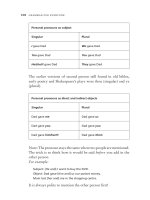
Grammar for everyone part 17
... and various verb forms. Contrary to the view expressed by some educationists, it is not sufficient for grammar to be dealt with ‘by the way’ or ‘as it arises within subjects’, for reasons already ... perfect Ali Baba and you could do the genie’s voice. If we practise our parts, the show will be ready for the Christmas party. 7. Can students explain the difference between a complement a...
Ngày tải lên: 29/10/2013, 02:15
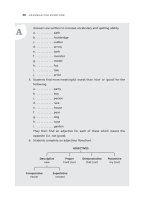
Grammar for everyone part 11
... adverbs of comparison These irregular forms cause difficulty for some students who use them wrongly and use an adjective instead (He did it good – or performed real bad). It is a good idea to ... sentence. For example: This is the worst firewood we have had. [adjective qualifying the noun ‘firewood’] It burns worst in wet weather. [adverb modifying the verb ‘burns’] For adverbs modifying o...
Ngày tải lên: 18/10/2013, 00:15
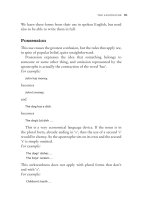
Grammar for everyone part 14
... with plural forms that don’t end with ‘s’. For example: Children’s teeth … 81 t h e A p o s t r o p h e A In spoken language, to avoid ambiguity, we can fall back on the longer form. For example: ... Jones’ Mercedes Avoiding confusion The apostrophe is traditionally used for clarity in abbreviations and other forms. For example: The MSc’s were awarded next. There are two s’s in ‘grass...
Ngày tải lên: 24/10/2013, 19:15
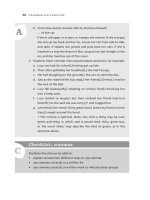
Grammar for everyone part 15
... on their own in their grammar exercise books. Some sentences should be given for homework to demonstrate independent learning and accuracy. It is, as always, important for the work to be corrected ... from the Latin word pars meaning part and describes the task we are doing when we divide a sentence to show how it is made up. 14 92 A For example: More information can be added to the s...
Ngày tải lên: 24/10/2013, 19:15

Grammar for everyone part 16
... to bed. Don’t (you) forget your lunch Abbreviations If the students are showing confidence in diagramming sentences and recognising the parts of speech, it is now appropriate for them to start using ... to answer, for example: First student: What did you have for breakfast? 2nd person: Baked beans. The answer is the direct object. One or two of these could be entered into students’ gram...
Ngày tải lên: 29/10/2013, 02:15
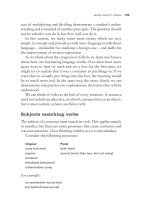
Grammar for everyone part 18
... everybody (everyone) either/neither (one) For example: no one/neither has arrived but both/all have arrived 109 M o r e A b o u t V e r b s A Uncountable forms are mainly in the singular. For example: much, ... concept and provide us with more language to talk about language – invaluable for studying a foreign one – and skills for the improvement of written expression. As we thin...
Ngày tải lên: 08/11/2013, 02:15
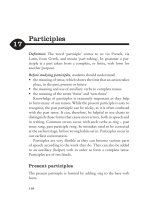
Grammar for everyone part 19
... (helper) verb in order to form a complete tense. Participles are of two kinds. Present participles The present participle is formed by adding -ing to the base verb form. 17 116 For example: eat + ... forms which include participles • be able to name the present and past participles of any common verb Participles as adjectives These are sometimes referred to as adjectival participles or...
Ngày tải lên: 08/11/2013, 02:15
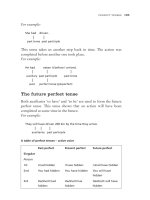
Grammar for everyone part 20
... For example: She had driven. past tense past participle This tense takes us another step back in time. The action was completed before another one took place. For example: He ... AM M A r for e V erYo n e C Checklist: perfect tenses Students should now be able to • define the term ‘participle’ • state the present participle of any common verb • state the past participle ... had eaten i...
Ngày tải lên: 08/11/2013, 02:15
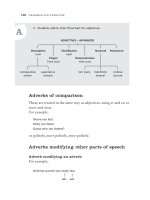
Tài liệu Grammar for everyone part 21 doc
... pause) between two balanced parts of a sentence, in which the second part explains or furthers the information given in the first part. For example: I got our tickets for the final: they had nearly ... adjective For example: He was so pleased. adv adj Adverbs formed from adjectives For example: My shoelace is loose. [adj] I tied it too loosely. [adv] 19.2 Activity: adjectives and...
Ngày tải lên: 15/12/2013, 13:15

Tài liệu Grammar for everyone part 22 pdf
... take different forms according to the part they play in the sentence. For example: As the subject: Who – Who are you? As the object: (For a person) whom – Whom did you see? (For a thing) what ... we contracted malaria. In Africa …. we contracted malaria. • For dramatic effect. For example: The glass shattered on the floor and a form appeared in the window … ‘It’s … It’s … a g…gh...
Ngày tải lên: 15/12/2013, 13:15